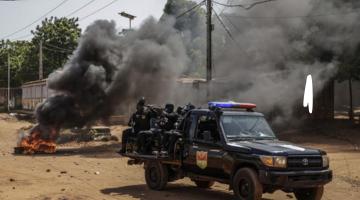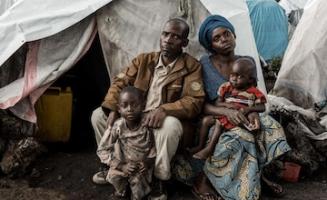Amilcar Cabral's work and writings are still as relevant today as they were when he walked the earth. The struggle for liberation in Palestine and across the continent of Africa is still alive and Cabral's teachings should be used as a guide in that fight.
Originally published in Al Mayadeen English.
Inkani Books, a publishing house from South Africa has released a number of incredible books in the past few years. These books include Tell No Lies, Claim No Easy Victories, the collected writings of Amilcar Cabral, as well as other books that correlate to the Zulu and Xhosa concept of Inkani, or stubborn determination, here, the determination of the oppressed to fight for liberation. The aforementioned text includes speeches and articles delivered by Amilcar Cabral; some of which are being translated into English for the first time. These articles, speeches, and communiques are required reading for revolutionaries today who are struggling with the agrarian question and the current wave of revolts and revolutions in the peripheries of the capitalist world system. Cabral was a Cape Verdean revolutionary who helped form PAIGC and other forums and institutions dedicated to the overthrow of Portuguese colonialism in Guinea Bissau, Cape Verde, Angola, and Mozambique. Although he was assassinated before the short-lived unification of Guinea and Cape Verde came to be, his ideas carry on in their relevance and potency today.
Economic, cultural, political, and armed resistance are themes explored in the majority of Cabral’s essays and speeches. All of these types of resistance revolve around a central axis: the question of land. Cabral knew that people do not fight for ideas alone and that it is the resolution of the immediate contradictions and struggles in their lives that animates them towards revolution. In a speech delivered in London, someone asked Cabral if PAIGC is a Marxist-Leninist party; Cabral’s answer tells of the type of revolutionary he was:
People here are very preoccupied with the questions: ‘are you Marxist or non Marxist? Are you a Marxist-Leninist’. Just ask me, please, whether we are doing well in the field. Are we really liberating our people, the human beings in our country from all forms of oppression? Ask me simply this and draw your own conclusions.
While this brilliant answer cuts away at ideological dogmatism and fanaticism, Cabral also knew that theory is a weapon in the hands of the oppressed. In an interview with a Portuguese journalist, Cabral puts forward a clear analysis of why his people are determined to resist. He relates the struggle of the people of Guinea and Cape Verde to the struggles in Cuba, Vietnam, and Palestine while also highlighting the clear distinctions in strategies and tactics of struggle in each locale. Many of the answers given by Cabral in this interview are relevant even today. When asked about Palestine, Cabral had a more lucid analysis than most contemporary analysts, presenting Palestine as a key element of the Arab struggle, rather than constructing Palestine as a black-box nation-state separate from the region. “We want the Arab peoples to obtain the freedom of the people of Palestine, to free the Arab nation of that element of imperialist disturbance and domination which “Israel” constitutes”.
When asked about Che Guevara’s theory of guerrilla struggle and its applicability to the Guinean struggle, Cabral further elucidated the importance of marrying theory and practice. Cabral points to the importance of understanding armed struggle as one facet of national liberation, while arguing that the people of Guinea must start from their own conditions as a launching point. The people of Guinea could not copy every tactic and strategy of the heroic Cuban people, nor the Vietnamese, but they could view these struggles as different terrains in the same fight. In this way, the beauty of Cabral’s statement on the Guinean struggle shines through; “our people are our mountains”, he said. While Vietnam had thick jungle cover, and the Cubans fought in the Sierra Maestra mountains, the conditions in Guinea were such that the people became the stand-in for the environment which was not favorable for clandestine armed struggle according to the accumulated knowledge of guerrilla movements. This is why, according to Cabral, the Guinean war of Independence was a ‘centrifugal’ struggle. They started in the large cities, then moved outwards towards the countryside. This is an inversion of the Chinese, Vietnamese, and Cuban struggles where the guerrilla forces started in the countryside and moved toward the city. Cabral and the PAIGC were master tacticians in that sense, understanding that they could not blindly copy the blueprints of other peoples, but rather could see those people as an inspiration while building a uniquely Guinean revolution.
This independence in our thoughts and actions is relative. It is relative because in our thought we are influenced by the thought of others. We are not the first to wage an armed struggle for national liberation, or a revolution. We did not invent guerrilla warfare–we invented it in our land…we must be aware that no struggle can be waged without an alliance, without allies.
The invention of guerilla warfare on one’s own land, with unique means and ends, contains the final and critical element of struggle: culture. During the Guinean revolution, there were many people who believed that adopting one’s own culture in contrast to the colonial culture meant uncritically adopting pre-colonial cultural practices. Cabral highlighted the failure of this strategy and urged the peoples of Guinea Bissau and Cape Verde to form a new, revolutionary culture through the armed, economic, and political struggle. In this assessment Cabral was not alone; the late Ghassan Kanafani was not only the spokesman of the PFLP, but edited their magazine and produced cultural works himself. The revolution in Palestine—much like the one led by PAIGC in Guinea—has produced a people with a strong, resistant mentality, and a revolutionary will that maintains cultural values and concretizes them through struggle. Cultural symbols revolving around land animate the struggles of today. In Palestine, the watermelon, the olive tree, the keffiyeh, and various tatreez symbols from each locale tie the people to the land and concretize the struggle in the subjective conditions of Palestine. This is the vision Cabral had of struggle in Africa, Asia, and Latin America; only through a thorough understanding of one’s own conditions, and the study of other revolutionary experiences can a movement advance towards liberation.
All of this is also intimately related to economic struggles against colonialism and imperialism. Cabral pushed for agricultural self-sufficiency, redistribution of land, and other economic forms of delinking from the capitalist world system. This, too, impresses the importance of charting an independent path toward revolution on those of us living in the shadow of Cabral and all the martyrs who came before us. The first task of national liberation according to Cabral is the reclaiming of the means of production which have been usurped by external, colonial forces. From there, the revolutionary forces can take the lessons learned regarding culture and the question of land and go about building a new society, free from colonial domination. Although Cabral is no longer with us, the forces of revolution are alive in Palestine and the Sahel, shining a light on the path to liberation.
Hanna Eid is a teacher, political analyst, and judoka.


















